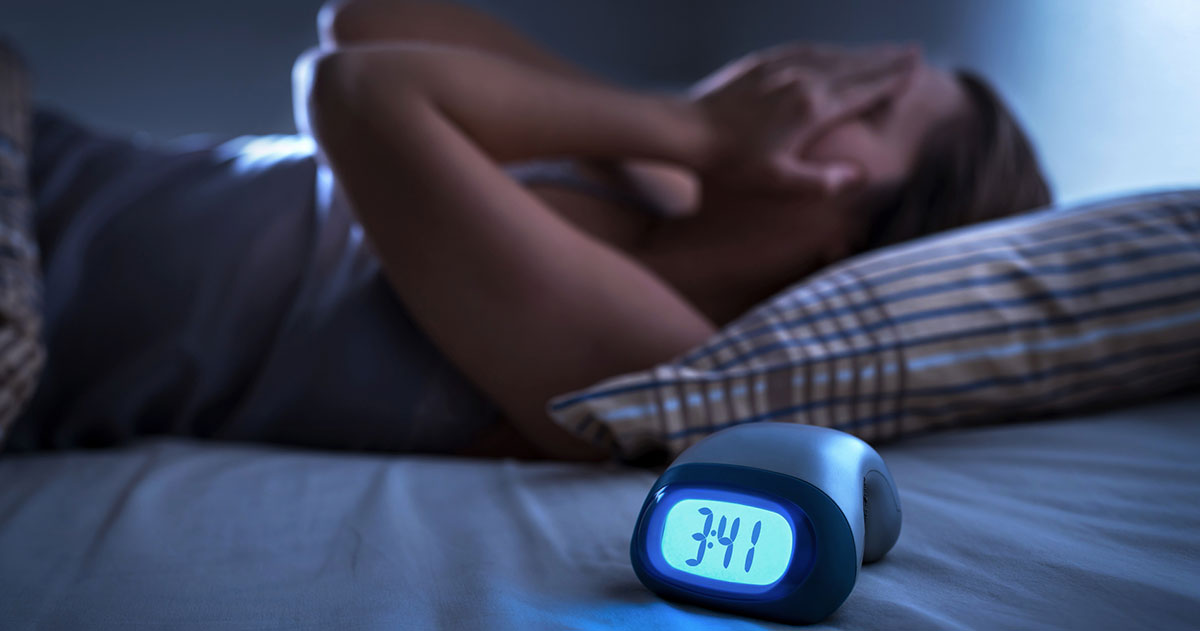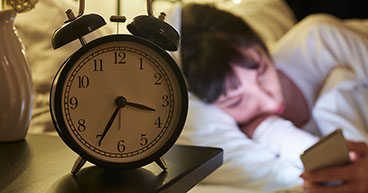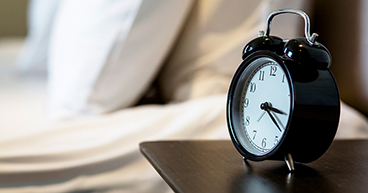
Regularly getting uninterrupted, refreshing sleep is important for good physical and mental health, helping to boost your immunity, keep the mind sharp, maintain a healthy weight and even reduce the risk of a variety of chronic diseases. The National Institutes of Health (NIH) recommends American adults get seven to eight hours of sleep each night, although that varies by individual.
But for an estimated 50 percent of those diagnosed with cancer and undergoing treatment, getting the recommended amount of sleep may be challenging. Insomnia and abnormal sleep-wake cycles are common for cancer patients, according to the NIH, impacting their quality of life and potentially their health.
“When I talk with patients, they report sleep difficulties for a variety of reasons,” says Kristen Trukova, PA-C, RD, Physician Assistant at City of Hope Chicago. “Thirty to 50 percent of people diagnosed with cancer have severe sleep difficulties. That can be anything from ‘I can’t fall asleep’ to ‘I keep waking up’ to ‘I don’t feel rested,’ so there are lots of ways they’re defining adequate sleep. Of course, fatigue is huge for people with cancer, especially when they’re in treatment.”
While sleep disturbances may be common, being aware of the various causes and following a few key tips may help many cancer patients get the important and healing sleep they need.
In this article, we’ll explain:
- Common causes of sleep issues in cancer patients
- How poor sleep may affect cancer patients
- Tips to help cancer patients improve their sleep
- When to consider a sleep consultation
If you’d like to learn more about the behavioral health services we offer cancer patients, or if you’re interested in a second opinion on your cancer diagnosis and treatment options, call us or chat online with a member of our team.
Common causes of sleep issues in cancer patients
A cancer diagnosis and subsequent treatment may disrupt many aspects of life, and regular sleep is no exception. Risk factors for sleep disturbances include those below.
Stress, anxiety and depression brought on by receiving a cancer diagnosis may disrupt sleep.
A hospital stay, especially since you’re in a strange bed, using an unfamiliar pillow or sharing the room with a stranger, may make sleep difficult. Doctors and nurses checking vitals or administering drugs or exams may also interrupt sleep and impact sleep quality.
Cancer treatment options, such as radiation therapy and chemotherapy, cause side effects that may change your sleep routine. For instance, nausea, constipation, diarrhea, bladder problems, night sweats or hot flashes, itchiness, fever, cough or trouble breathing may make it difficult to fall asleep and/or stay asleep.
Pain, whether from surgery, other treatments or the cancer itself, may disrupt sleep.
Too many naps prompted by fatigue due to the cancer or its treatments may make it difficult to maintain a regular nighttime sleep schedule.
Medications may cause side effects that may prevent getting enough sleep. Medications that may contribute to sleeplessness include:
- Corticosteroids
- Antidepressants
- Anti-convulsant drugs
- Hormone therapies
- Over-the-counter supplements that contain caffeine
Make sure your entire health care team knows the prescription and nonprescription drugs you’re taking, so they can better identify—and treat—potential sleep problems.
How poor sleep may affect cancer patients
Research indicates sleep problems are associated with higher levels of pain, longer hospital stays and more complications for cancer patients.
Studies also have shown that because many bodily functions are influenced by sleep, including the immune system, regulation of hormones and metabolism, how you sleep may influence how well your body responds to cancer treatments.
A developing field of cancer research into new treatments involves chronotherapy, which uses circadian rhythm or sleep-wake cycles to make radiation therapy, chemotherapy or immunotherapy work better by targeting cells’ proteins, enzymes or receptors that are sensitive to circadian timing in order to kill more cancer cells and reduce healthy tissue damage.
Sleep quality is important for physical and mental well-being. A good night’s sleep helps you to think more clearly, helps lower your blood pressure and helps you maintain a healthy appetite. Prolonged trouble sleeping may also increase anxiety or depression, two of the most common behavioral health issues affecting cancer patients.
Tips to help you sleep
Identifying the source of your sleep challenge is the first step toward resolving it. Sharing information about changes in your sleep habits and lifestyle with your health care team will allow them to help diagnose the issue and help you get the sleep you need.
Trukova recommends these tips to help patients get better sleep:
Practice good bedtime habits such as going to bed when you’re sleepy in a quiet, dark, cool room and a comfortable bed. Try to keep a sleep schedule by turning in at about the same time each night.
Stop watching television or scrolling on your computer, phone or tablet a couple of hours before bedtime, since the blue light emitted from electronics may disrupt your sleep.
Refrain from eating too close to bedtime, but if you do crave a nighttime snack, eat a small portion of a high-protein food like Greek yogurt.
Exercise regularly as much as possible but not too late in the day.
Cognitive behavioral therapy or relaxation therapy may help you reframe negative thoughts and reduce stress and anxiety. Muscle relaxation, guided imagery and self-hypnosis may also help ease tension and stress.
Avoid difficult conversations about your worries or fears in the evening or late in the day.
Relax by taking a soothing, warm bath or shower, reading, praying, listening to calm music and doing breathing exercises at bedtime.
Watch your alcohol consumption. Alcohol may help you fall asleep but may disrupt sleep after it wears off.
Maintain adequate nutrition, especially if you’re experiencing nausea or vomiting, which may increase fatigue and result in more frequent daytime naps. A registered dietitian may help you identify the nutrients you need to help your body stay strong and maintain healthy sleep hygiene.
Limit naps to 30 minutes and avoid napping late in the day.
Get out of bed and do a calming activity, such as reading, if you’re tossing and turning. Return to bed when you feel sleepy.
Consider taking sleep medication prescribed by a physician. These medicines are usually prescribed for a short duration and only after other strategies have proven ineffective.
Bring your own pillow, comforter or cozy pair of socks to the hospital, along with earplugs or a sleep mask, to make it easier to rest.
Take steroids, if prescribed for your cancer treatment, as early in the day as possible.
As a registered dietitian and physician assistant, Trukova recommends patients watch what they eat, since gastroesophageal reflux or GERD is a common side effect of chemotherapy or immunotherapy and may cause discomfort and sleep challenges.
“I recommend they don’t eat for two hours before they lie down,” Trukova says. “Some people know what their trigger foods are—for some people, it’s oranges or tomatoes. Typically, greasy or spicy foods are going to be irritative—and caffeine, which allows the sphincter between the stomach and esophagus to relax, so the more coffee or caffeinated beverage you drink, the more easily your stomach contents can reflux up into your esophagus.”
The stimulating effect of caffeine itself may be a problem since it stays in your system for up to six hours, Trukova says, adding that patients may be unaware that certain supplements or herbal remedies they’re taking may contain caffeine. Particularly be on the lookout for guarana, a common ingredient that’s highly caffeinated.

When to consider a sleep consultation
Insomnia is officially defined as difficulty sleeping at least three nights a week for more than one month. But anytime you find yourself regularly unable to sleep, waking frequently during the night or just not feeling rested for an extended period, tell your doctor, who can help diagnose and treat the underlying issue.
Keeping a sleep diary, noting the hours you’re awake and asleep and how you feel, may help pinpoint the problem.
For cancer patients, treating pain and digestive or urinary problems may also help address sleep challenges. For older adults, changes in sleep patterns are common, but doctors also may look for underlying issues like restless leg syndrome, sleep apnea or other preexisting sleep disorders.
While sleep is important to everyone’s health, maintaining healthy sleep hygiene is even more important for cancer patients.
“In cancer treatment, whether it’s surgery or chemotherapy or radiation therapy, some damage is caused to healthy tissue,” Trukova says. “Sleep is a time when the body can repair damaged tissue, rebuilding white blood cells, red blood cells—those types of things.”
If you’d like to learn more about the behavioral health services we offer cancer patients, or if you’re interested in a second opinion on your cancer diagnosis and treatment options, call us or chat online with a member of our team.



